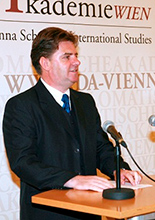DA alumnus Darko Pavlovic on his career since graduating from SPC 28 in 2009

DA: Following your studies at the DA, what exactly are your responsibilities on the job and how did your career path look like so far?
Darko Pavlovic: My main responsibilities are substantial participation and representation in large-scale international missions related to crisis prevention, post-conflict development and analysis (i.e. early warning mechanisms and recommendations). Recently I served as Long-Term Observer (LTO) at EOM with OSCE and EU or bilateral international organisations and observation/audit missions (USAID/CAI) within the Dutch Ministry of Foreign Affairs' 3W programme (World Wide Working).
Some of my further responsibilities are:
- Strong co-operation within multi-cultural team of seconded candidates by the OSCE participating states or recruited through the Fund for Enhancing the Diversification of Election Observation Missions (the diversification fund) to each ODIHR election observation activity. In accordance with the ODIHR observation methodology, it is essential for EOMs to have a long-term approach, enabling a complete and substantive analysis of the election. LTOs form a crucial part of the observation mission as they are its representatives in the regions. You must be aware that you are always perceived as a representative of the mission and your seconding state, even outside your office hours. In fulfilling your duties, you should exercise prudence and respect your local interlocutors. LTO work is critical and challenging, and the job requires different skills, hard work, flexibility, and good will. You have to handle a lot of information, meet numerous interlocutors, and provide careful reporting, and all that starts right after you arrive in your AoO.
- In all my missions and projects, my knowledge and experience from the DA has been very useful and combined with my previous multilateral experience led to good performance in the field and concerned offices as a synthesizing factor.
Have you always been interested in this specific career, or has this interest developed over time?
To some extent this interest has been developed over time as an evolutionary career development process based on needs and calls from concerned international organisations.
How has the DA helped you develop your career?
The DA curriculum of my post-graduate course on EU integration for young diplomats from the SEE region has been well designed and matched most of the needs of international experts involved with most imortant issues regarding the international arena.
Is there a specific skill set taught at the DA that is particularly useful for your current job?
Among many skills developed prior to my participation in the DA's Special Course, some new have been added such as negotiation, lobbying, training methodologies to the level of synthesizing and resuming or completing as a certain "polish" of my ongoing career.
Where do you think the future will take you?
It is difficult to predict concrete positions or missions, but it will be probably a certain continuation of my career in diplomacy, political and socio-economic development, election process and observation with analysis, security sector, crisis prevention, post-conflict development, etc. In all these sectors I have a strong background and substantial experience combined with training and LLL (life long learning). My ambition is to share all these qualities with a younger generation of students and experts including those at the DA, which has been a booster for my career. This is where I see my place in the future if we match our opportunities, needs and references.
[August 2023]